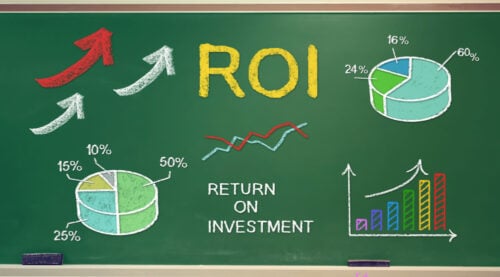Investing in penny stocks can be a great way to get started in the market or to add some diversity to your portfolio. However, it’s important to know when to sell penny stocks to maximize your return on investment. That said, you may be wondering: How long should I hold penny stocks? Read on to find out the answer.
Can You Hold Penny Stocks Long Term?
Many investors are attracted to penny stocks because of their low price and the potential for large returns.
It is possible to hold penny stocks for a long period of time, but these stocks are very risky and volatile, which makes them unsuitable for long-term investment.

Penny stocks are generally defined as stocks that trade for less than $5 per share. These stocks are usually not listed on major exchanges, and they tend to be much less liquid than larger stocks.
Penny stocks are often very volatile, meaning their prices can rise and fall sharply over a short period of time. This volatility can be caused by a number of factors, including news events, changes in investor sentiment, and even rumors.
Is It a Good Idea to Hold Penny Stocks?
Because of their volatility, it is not the best idea to hold penny stocks. Instead, they are best suited for short-term trading.
Investors who are looking to hold a stock for the long term should avoid penny stocks and focus on larger, more established companies.
Penny stocks are also very risky. The vast majority of these stocks are not profitable, and many of them are simply scams. This makes it very difficult for investors to make money by investing in penny stocks.
What Happens When a Penny Stock Goes to 0?
When a penny stock goes to 0, it means that the company is no longer in business and the shareholders have lost all of their investment.
This can happen for a variety of reasons, including mismanagement, fraud, or simply bad luck. Whatever the cause, it’s always a sad day for those who have invested in the company.

While it’s never fun to lose money, there are a few silver linings to be found when a penny stock goes to 0.
- First, if a penny stock trader held the stock for less than a year, they can claim it as a short-term capital loss on your taxes. This can offset any gains you may have had elsewhere and lower your overall tax bill.
- Second, even though you’ve lost money on the investment, you can use it as a learning experience. It’s important to remember that not every penny stock is a winner, and you should always do your research before investing.
- Finally, if the company did go bankrupt, penny stock traders may be able to recoup some of their losses through bankruptcy proceedings. While it’s not guaranteed, it’s always worth checking out.
What Percentage of Penny Stocks Succeed?
When it comes to penny stock trading, there is no simple answer to the question of how many succeed.
This is because success depends on a number of factors, including the company’s financial stability, the overall market conditions, and the investor’s own risk tolerance and investment strategy.

That said, some estimates put the percentage of penny stocks that eventually become successful at around 10%. This means that for every ten penny stocks you invest in, one may eventually become a profitable investment.
Of course, this is not a guarantee of success and there are no guarantees in the world of investing. However, this does give you an idea of the potential upside of investing in penny stocks.
What Is the Most Successful Penny Stock Ever?
GameStop was one of the most successful penny stocks ever. The company’s stock price rose in just a matter of months, making it one of the biggest rags-to-riches stories in recent memory.
The success of GameStop is a prime example of how penny stocks can generate huge returns for investors who are willing to take on some risk. While GameStop is no longer a penny stock, there are plenty of other companies that trade for less than $5 per share and could be poised for big gains in the future.
So, if you’re looking for the next best penny stock like GameStop, keep an eye out for the ones that could be poised for success.
What Are the Advantages of Penny Stocks?
Penny stock trading is often associated with high risk and low reward. While there is certainly more risk involved in investing in penny stocks, there can also be a lot of rewards. And with that said, let’s take a look at some of the advantages of penny stocks.
Penny stocks offer investors a high degree of liquidity, which is the ability to buy and sell shares quickly and at low costs.
For example, buying penny stocks worth 1,000 shares for $0.50 per share. You can then turn around and sell those same shares for $0.60 per share, making a quick $100 profit.

Another advantage of day trading penny stocks is that they tend to be much less expensive than traditional stocks. This means that you can get started with investing in penny stocks with very little money.
Additionally, since penny stocks are not as well known or followed by the major financial media outlets, they can be easier to trade without being influenced by outside factors.
Lastly, most penny stocks tend to be much more volatile than traditional stocks, meaning that they can go up or down in value very quickly. This can be a good thing or a bad thing, depending on how you trade penny stocks.
However, if you are able to correctly predict the direction of the market, you can make some very large profits in a very short period of time.
What Are the Disadvantages of Penny Stocks?
Penny stocks are not without their risks and disadvantages. For starters, they are much more volatile than traditional stocks.
This means that they can rise and fall in value very rapidly, which can be a major problem for investors who are not prepared for it.
Another disadvantage of penny stocks is that they tend to be much less well-known and understood by the general investing public. This lack of familiarity can make it difficult to find information about them, which can make it harder to make informed investment decisions.
Lastly, penny stocks are often traded on lesser-known exchanges, which can make them more difficult to buy and sell. This lack of liquidity can make it tough to get in or out of a position quickly if needed.
All in all, penny stocks are a high-risk investment. They can be very profitable, but they can also lose a lot of money just as easily. Investors need to be aware of the risks before getting involved.
Can You Get Rich From Penny Stocks?
The answer to the question, unfortunately, is not a simple yes or no. While there are certain investors who have made a great deal of money by investing in penny stocks, there are also many who have lost everything they put into them.
Penny stocks are notoriously volatile and risky, and as such, they are not suitable for everyone.

If you’re thinking of investing in penny stocks, it’s important that you do your research and understand the risks involved. Only then can you make an informed decision about whether or not they are right for you.
How Do You Find Penny Stocks Before They Explode?
Investing in penny stocks can be a risky proposition, but if done correctly, it can also lead to huge profits. So, how do you find penny stocks before they explode?
Here are a few tips to increase your chances of finding penny stocks before they explode:
- Do your research. This may seem like a no-brainer, but it’s important to do your due diligence when investing in penny stocks. Make sure you understand the company, stock market news, and the risks involved before investing.
- Look for companies with solid fundamentals. While penny stocks are often volatile, you want to look for companies that have strong fundamentals. This includes things like a strong balance sheet, healthy revenue growth, and positive earnings.
- Monitor insider buying activity. Another good indicator that a penny stock is about to explode is insider buying activity. If company insiders are buying up shares, it’s a good sign that they believe in the future of the company.
- Watch for analyst upgrades. When analysts start upgrading a penny stock, it’s often a sign that big things are happening with the company. Keep an eye on analyst reports and act accordingly.
- Stay up to date on news and rumors. In the world of penny stocks, news and rumors can move the market. So, it’s important to stay up to date on all the latest news and rumors surrounding your favorite penny stocks.
How Many Penny Stocks Should I Buy?
There’s no right or wrong answer to this question as it all depends on your individual circumstances and goals. It’s up to you to decide how many shares you’re comfortable purchasing.
However, there are a few things to consider when making your decision:
- Amount of funds. If you have a limited amount of funds available, you may want to purchase fewer shares so that you don’t tie up all of your money in one investment.
- Investment goal. Are you looking to make a quick profit, or are you more interested in long-term growth? Depending on your answer, you may want to purchase different types or amounts of penny stocks.
- Risk tolerance. Some people are comfortable with more risk than others. If you’re the type of investor who is willing to take on more risk for the potential of higher rewards, you may be more inclined to purchase more penny stocks.
Is It Hard to Sell Penny Stocks?
It’s not that hard to sell penny stocks, but it can be tricky to find buyers. Since penny stocks are so volatile, most investors are unwilling to take a chance with them.
That said, there are still plenty of people out there who are willing to gamble on penny stocks. The key is to find these individuals and convince them to buy your shares.

It’s also a good idea to familiarize yourself with the company whose stock you’re selling. This way, you’ll be able to answer any questions potential buyers might have.
Do You Pay Taxes on Penny Stocks?
While it’s true that penny stocks are not subject to the same level of regulation as other investments, they are still subject to taxation. In fact, the Internal Revenue Service (IRS) considers penny stocks to be a form of taxable income.
This means that if you make money from trading penny stocks, you will need to pay taxes on your profits. However, there are a few things you can do to minimize your tax liability.
The IRS views penny stocks as speculative investments, which means they are subject to short-term capital gains taxes. This means that if you sell your penny stocks within one year of purchase, you will pay taxes on your profits at your ordinary income tax rate.
However, if you hold onto your penny stocks for longer than one year, you will only pay taxes on your profits at the long-term capital gains tax rate.
Of course, there are always exceptions to the rule. For example, if you buy penny stocks through an employer-sponsored retirement plan, such as a 401(k), you will not be subject to any taxes on your profits until you withdraw the money from the account.
Similarly, if you inherit penny stocks from someone who has died, you will not have to pay any taxes on the stocks until you sell them.
Additionally, if you invest in penny stocks through an employer-sponsored retirement plan, such as a 401(k), you will not have to pay any taxes on your profits until you withdraw the money from the account.
What Are the Average Returns on Penny Stocks?
There is no one-size-fits-all answer. Each penny stock is different and will perform differently over time. Some penny stocks may soar in value, while others may crash and burn.
In general, however, the average return on penny stocks is much higher than the return you would get from investing in more traditional stocks. This is because penny stocks are much more volatile, and therefore offer greater potential for profit.

Of course, with greater potential for profit comes greater risk. Penny stocks are very risky investments, and you should only invest if you are prepared to lose all of your investment. If you cannot afford to potentially lose your entire investment, then you should not invest in penny stocks.
Final Thoughts: How Long to Hold Penny Stocks?
Ultimately, it’s up to you. However, we think it’s important to remember that penny stocks are not meant as a long-term investment vehicle. If you’re looking for stability and growth potential, penny stocks may not be right for you.
That said, if you’re comfortable with the risks and understand how to play the game in the penny stock market, go ahead and roll the dice. Always remember to do some research, consult with an expert, and decide what’s best for you.


 Tags:
Tags:










